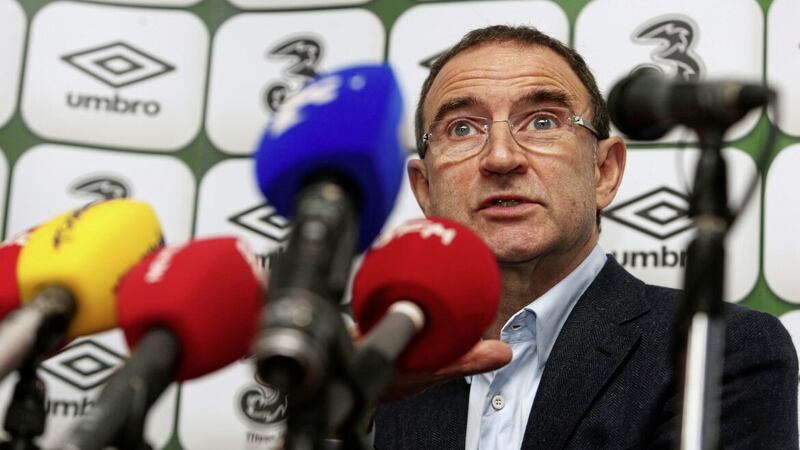ONE of the most impressive aspects of Martin O’Neill’s autobiography, released on Wednesday past, is that he’s written the 350 pages all by himself. Nothing was left to chance to a ghost-writer, nothing open to be paraphrased or interpreted. Every word contained is authentically his.
It took the former Celtic and Republic of Ireland manager around six months to complete a life's memoir, and it is – as O’Neill might say himself – a really fine effort.
‘On Days Like These’ is laced with dry wit and one-liners to keep the reader entertained, while it must have been a daunting challenge to boil down a staggering life in football, now in its sixth decade, admitting that quite a lot of his story ended up on the cutting room floor.
O’Neill’s memory recall is quite astonishing.
Attending the 1958 All-Ireland football final at Croke Park between Derry and Dublin as a six-year-old, he writes: “A man with crooked yellow teeth comes to claim the empty place beside my mother. He is very pleasant to us, but he’s not going to give his seat up for anyone so I will watch the hour-long game on my mother’s lap… My brother is not playing. He is a substitute… ‘Where is Leo? Where is Leo?’ I pester my mother…
“Derry lose the match… I tell my mother that – when I grow up – I want to play for Derry and win the All-Ireland final.”
The memory of Jimmy McAlinden remains undimmed by time and how O'Neill remains deeply indebted to the Belfast Celtic great for giving him his break with Irish League club, Distillery, before helping negotiate a £45 per week contract at Nottingham Forest for the young Kilrea man.
Naturally enough, O'Neill dedicates quite a bit of the book to his five unforgettable years as Celtic manager, but much less is afforded to the five he spent more recently with Ireland, just 19 pages.
In one of many of his publicity interviews in the past few days, O’Neill described how he felt like an ‘outsider’ and a ‘northerner’ while in charge of the Republic of Ireland team.
In O’Neill’s eyes, the Irish media stands accused.
As this media outlet’s Republic of Ireland correspondent for over two decades, I watched O’Neill’s team during his five-year tenure and attended a countless number of his press conferences.
Often, there was a sharp edge to some of the media’s questions and indeed some of the manager’s answers.
The media and media relations have changed beyond recognition over the past few decades: from the days of press members sharing an occasional jar with Jack Charlton and his players after big tournament wins to the cold, distant choreography of top table press briefings, ubiquitous press officers, social media’s insatiable pursuit of headlines and how click bait has come to infect and cheapen the whole process of meaningful enquiry.
O’Neill is old school and was sometimes perplexed at the tone of the media’s questions before and immediately after games. Some of the scrutiny on O’Neill was indeed over the top, but a good portion of it was fair too.
There is also this prevailing notion that Stephen Kenny gets an easy ride from the Irish media in comparison. If you’ve attended any of the current manager's press conferences, nothing could be further from the truth.
Brian Kerr got hammered when he was in charge of the Irish senior team in the mid-Noughties. I’m sure he felt some of the criticism was unfair too.
The point here is there has always been a caustic element to the media coverage of whoever has been in charge of the Republic of Ireland team, especially when results start to go pear-shape, which they inevitably do considering Ireland’s modest standing in the international game.
Of course, one person's caustic approach is another's forensic enquiry.
What O’Neill - and indeed many sports figures for that matter - might have benefited from was a different approach to media relations.
Round table conversations with the media would have been better suited to O'Neill and drawn out his natural charm.
The top table felt like a barrier more than anything else.
Of course, the days of meaningful access had disappeared long before Martin O’Neill breezed into Dublin’s glitzy Gibson Hotel in late 2013 with the singular intention of delivering Euro 2016 qualification.
Despite achieving this objective, conjuring some wonderful memories in France six years ago and being a game away from reaching the 2018 World Cup finals, O’Neill left the Irish post with little affection for the Irish media and little was returned in his direction.
That's perhaps how media relations operate these days. No feeling and no empathy.
Results obviously took a turn for the worse after Denmark hammered the Irish in Dublin in that ill-fated World Cup play-off.
Maybe that was the moment to make his exit as Ireland manager rather than opt for another crack at the Euros.
We always remember exits.
In football terms, they’re usually inglorious affairs.
But, with the passage of time, Martin O'Neill's record as Ireland manager looks more and more favourable.
There were some magical moments along the way and a slice of the manager's inimitable dry wit that entertained us.
And not forgetting Roy Keane who never once let reporters down.
“As the great Humphrey Bogart says to Ingrid Bergman in Casablanca,” O’Neill writes, “'We’ll always have Paris’. I know that France did exist and that I’ll always have that.’”






